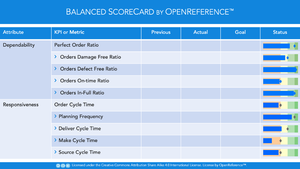A109
Difference between revisions of "A109"
| Line 3: | Line 3: | ||
[[File:OR-BSC.png|thumb|Balanced Scorecard example]] | [[File:OR-BSC.png|thumb|Balanced Scorecard example]] | ||
===Notes=== | ===Notes=== | ||
| − | The [[sc:A102|discovery]] and [[sc:A108|documentation/definition]] of supply chains | + | The [[sc:A102|discovery (A102)]] and [[sc:A108|documentation/definition (A108)]] of supply chains are a key preceding steps. Without clearly defined supply chains, scorecards may contain aggregate data of conflicting supply chain types e.g. [[Link::t:MTO]] and [[Link::t:MTS]] together. Without strategy, metrics chosen are not clearly linked to strategic priorities. The {{OR}} wiki provides all necessary definitions. [[Category:Process]][[Category:Supply Chain]] |
{{Object | {{Object | ||
|name=Define Scorecard | |name=Define Scorecard | ||
Revision as of 16:21, 17 November 2021
The activities associated with the selection of the key metrics for each performance attribute for each supply chain. A scorecard is used to define the metrics of most interest to an organization, to arrange them by area of impact, by strategic linkage, and to provide a container for later benchmarking comparisons. Each scorecard is built from a subset of hundreds of OpenReference metrics.
Contents
[hide]Notes
The Discovery (A102) and Documentation/definition (A108) of supply chains are a key preceding steps. Without clearly defined supply chains, scorecards may contain aggregate data of conflicting supply chain types e.g. Make-to-Order and Make-to-Stock together. Without strategy, metrics chosen are not clearly linked to strategic priorities. The OpenReference wiki provides all necessary definitions.
Workflow
| Process |
| ||||||||||||||||||
|---|---|---|---|---|---|---|---|---|---|---|---|---|---|---|---|---|---|---|---|---|
|
A109 |
|
||||||||||||||||||
